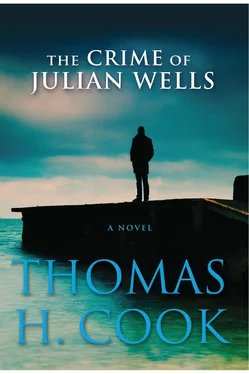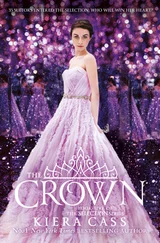Thomas Cook - The Crime of Julian Wells
Здесь есть возможность читать онлайн «Thomas Cook - The Crime of Julian Wells» весь текст электронной книги совершенно бесплатно (целиком полную версию без сокращений). В некоторых случаях можно слушать аудио, скачать через торрент в формате fb2 и присутствует краткое содержание. Год выпуска: 2012, ISBN: 2012, Издательство: Grove Press, Жанр: Криминальный детектив, на английском языке. Описание произведения, (предисловие) а так же отзывы посетителей доступны на портале библиотеки ЛибКат.
- Название:The Crime of Julian Wells
- Автор:
- Издательство:Grove Press
- Жанр:
- Год:2012
- ISBN:9780802194589
- Рейтинг книги:5 / 5. Голосов: 1
-
Избранное:Добавить в избранное
- Отзывы:
-
Ваша оценка:
- 100
- 1
- 2
- 3
- 4
- 5
The Crime of Julian Wells: краткое содержание, описание и аннотация
Предлагаем к чтению аннотацию, описание, краткое содержание или предисловие (зависит от того, что написал сам автор книги «The Crime of Julian Wells»). Если вы не нашли необходимую информацию о книге — напишите в комментариях, мы постараемся отыскать её.
The Crime of Julian Wells — читать онлайн бесплатно полную книгу (весь текст) целиком
Ниже представлен текст книги, разбитый по страницам. Система сохранения места последней прочитанной страницы, позволяет с удобством читать онлайн бесплатно книгу «The Crime of Julian Wells», без необходимости каждый раз заново искать на чём Вы остановились. Поставьте закладку, и сможете в любой момент перейти на страницу, на которой закончили чтение.
Интервал:
Закладка:
He eased back into his chair and, with that movement, seemed to deflate.
“It’s a classic play, Philip,” he told me. “The trick is to make sure that the one you give up is as innocent as a child, one who can be devoured like Saturn devoured his children, without their ever knowing why.” He paused, then added, “That’s why, as a ploy, it’s called the Saturn Turn.”
These two little boys, my father and my best friend, had played a lethal trick, but Marisol had died in earnest.
“Julian never forgave himself,” I told my father “He was good in that way. He thought only of the consequences of his acts, never of their intention.”
“I hope you can forgive me, Philip,” my father said.
“I do,” I assured him. “But as Julian must have known, it’s Marisol who can’t.”
When he gave no response to this, I said, “But then it’s always like that, isn’t it? You said so yourself.”
I was surprised that I felt neither ire nor bitterness as I quoted him: “It’s always the little people, too small for us to see, the little, dusty people, who pay for our mistakes.”
I left him a few minutes later, expecting to face the night alone, but to my immense relief, I found Loretta waiting in the lobby of my building.
“It’s a lovely evening,” she said. “How about a walk through the park?”
We left the building and headed out into the night. She could see that I was shaken, but she asked no questions, and thus left it to me to decide when and where to speak.
We had already walked some distance into the park and taken a seat on one of its benches before I did.
“One night I came upon Julian and my father at Two Groves,” I began. “They were alone for a long time in the study. It was very late and I’d gone upstairs to bed. But later I came down again and found them there, talking. They both looked rather surprised, and a little jarred, by my sudden appearance. They waved me in and we all talked a while, and I went back up to bed soon after. But it was in their eyes, Loretta. Conspiracy.” I drew in an unsteady breath. “It was just a game,” I said, then in a sudden rush, I related everything that my father had just told me. “He and my father promised each other never to mention Argentina. Like little boys with their blood oaths. And so he never did.” I shrugged. “And I suppose that’s what he couldn’t bear any longer, the fact that he had this crime bottled up inside him and couldn’t release it.”
Loretta looked doubtful. “That’s why he never confessed? Because he promised your father?”
Her question stopped me cold. No, of course not, I thought. Julian would not have held to such a childish oath. Nor would my father have cared if he’d broken it. After all, my father had just confessed his own complicity in Julian’s crime.
So why had Julian never confessed, and why had he chosen death over that confession?
I recalled how, in light of his own father’s death, Julian said that a little boy required a hero, someone he could look up to, someone who could guide him. Later still, he had concealed the identities of the men who massacred the villages of Oradour. When I asked him why he’d done this, his answer was simple. What would be the good, he asked, of telling some little boy that on a particular day in a particular place his father had been complicit in a great crime?
Had I been that little boy?
“No, Julian didn’t confess because of me,” I said to Loretta. “He didn’t confess because I was still a little boy to him.”
Then I told her how I’d reached this conclusion, the fact that Julian must have been profoundly influenced by his own father’s death, how he must have come to think of my father as central to my life, how he’d known that he could not confess his crime without revealing my father’s complicity in it. He had protected me as he’d protected the children of the soldiers who massacred the villagers of Oradour. It was all of a piece, I told her.
At the end of this, Loretta simply stared at me doubtfully.
“It’s all too neat, Philip,” she said. “And it’s all too simple. That’s natural, of course, because when a man you love kills himself, you want it to be about one thing. Just one thing you could have changed. But for some people, it’s not one thing. It’s everything.” She looked at me pointedly. “Julian killed himself because he was like Marisol,” she told me, “the victim of a Saturn Turn.”
When she saw I didn’t understand this, she continued.
“His simple goodness turned on him,” she said. “Life used it against him in the same way Vargas used Marisol’s innocence against her.” She shrugged. “The meek never inherit the earth, Philip.”
I thought of poor, benighted Swaziland, Africa’s last kingdom. Julian had gone there some years before, then written an article about the conditions he’d found, how, while their king ordered fleets of luxury cars and flew about in a private jet, the people lay on their stomachs lapping water from fetid pools, picked chicken heads and pig’s feet from the dumping grounds of the nearest abattoir, and brought this muck back home to cook in battered pails-a people whose life expectancy was thirty-one. In the final passage of his essay, Julian had written of the red-dirt townships and the plywood shanties, the motionless pools of poisoned water, the mud hovels and rusty sheds, where life comes for the people of Swaziland, as it has always come for the truly innocent, “with a knife in its hand.”
As Loretta had now made it clear, that same life, fixed in a Saturnine gaze, had at last come for Julian.
“I don’t want to be alone tonight, Loretta,” I confessed.
If she’d had the smallest hesitation, the look in her eyes would have betrayed it. But I saw only that she’d grasped the full meaning of what I’d said.
“Perhaps not ever,” she said.
I knew that it was not an ending Jane Austen would have written, orchestrated by the peal of marriage bells, all happiness assured, but even so, I took Loretta’s hand.
“Perhaps not ever,” I repeated.
She smiled. “Do you know what you would have said to him if you’d been in the boat?” she asked.
I shook my head. “Not yet,” I told her.
But by the time we reached home, I did.
After
He folds the map and puts it on the table beside his chair. Beyond the window, he sees the flat gray waters of the pond. The boat, its yellow paint long faded, rests beneath a weeping birch.
He rises, walks to the window, and looks out.
In the distance, a small breeze rustles the leaves of the birch and skirts along the green lawn and gently rocks the purple irises that grow beside the water. He has seen so many grasses, so many flowers. The lavender fields of France, the cloudberries of the Urals with their little orange petals, the feather grasses of the pampas swaying like dancers.
He will miss these things.
He considers the act, then its consequences.
He will make it clean.
There will be no fuss.
He turns and gives a final glance at the map. He has studied so many maps. He thinks of the water bearers of the world, almost always women, hauling their jerry jars to the river or the lake. His mind is like those jars, worn and dusty, scarred by use, but still able to hold its heavy store of memory.
And yet there is something he forgot.
He walks to the small desk in the corner, opens the notebook, and tears out the top sheet. He folds it carefully, without hurry, then sinks it deep into his pocket.
It is disturbance you must look for, the old trackers told him. Not prints. Not trails. But disturbance in the spear grass, a sense of reeds askew. Those will lead you to the one you seek.
Читать дальшеИнтервал:
Закладка:
Похожие книги на «The Crime of Julian Wells»
Представляем Вашему вниманию похожие книги на «The Crime of Julian Wells» списком для выбора. Мы отобрали схожую по названию и смыслу литературу в надежде предоставить читателям больше вариантов отыскать новые, интересные, ещё непрочитанные произведения.
Обсуждение, отзывы о книге «The Crime of Julian Wells» и просто собственные мнения читателей. Оставьте ваши комментарии, напишите, что Вы думаете о произведении, его смысле или главных героях. Укажите что конкретно понравилось, а что нет, и почему Вы так считаете.












